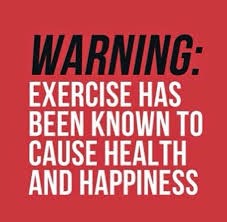Exercise Yourself Happy
The Winter weeks are whittling, but it is still cold and snowy. Did you know that exercise can help when you are feeling low? Scientific understanding of mental health disorders is increasing — and exercise is emerging as a potent healing tool.
Science Says: Exercise Benefits Mental Health
Experts offer multiple reasons why exercise positively impacts mental health; most agree it’s likely a combination of indirect and direct factors. Exercise provides better circulation and reduced inflammation, and exposure to positive environmental factors; it also releases a neurotransmitter called dopamine into your brain, which is a chemical necessary for feelings of pleasure and happiness. This can lead to boosts in psychological outlook and often perceptual and behavioural shifts.
*According to research studies, exercise may improve mental health in the following ways:
– By enhancing physiological health: “Physical activity benefits overall brain health by reducing peripheral risk factors for poor mental health—such as inflammation, diabetes, hypertension and cardiovascular disease—and by increasing blood flow and associated delivery of nutrients and energy,” says Angela Clow, PhD, professor in the department of psychology at the University of Westminster, London, and co-editor of Physical Activity and Mental Health. *(Reference: www.ideafit.com — Otto & Smits 2011, and Clow & Edmunds 2014)
– By raising tolerance for emotional stress: *When you exercise, you’re actually subjecting yourself to a low-level form of stress by raising your heart rate and triggering a burst of hormonal changes. Having more physical and emotional strength—from consistent fitness training—seems to help people adapt better when tough situations occur. So, when you subject yourself to the stress of exercise enough, your body will eventually get better at handling the rest of life’s stressors. *(Reference: www.mindbodygreen.com)
– By boosting self-efficacy and confidence: People who master a new skill such as exercise improve self-efficacy, which subsequently leads to higher self-esteem. High self-efficacy predicts well-being. When you start to exercise and see your body transform, you will not only like how you look, but also feel stronger, more independent, and more confident.
– By fostering social contact: Social interactions improve mood. Exercise frequently with others; friend and family encouragement and support go a long way toward improving one’s attitude.
– By diverting negative thinking: People with depression or anxiety often get stuck in negative thought cycles. Exercise, especially when mindful, may be a diversion from self-rumination, focusing thoughts away from negative inner concerns toward engagement with the present and with pleasurable experiences.
– By energizing: You no doubt have days when you just feel too tired to exercise. But no matter how exhausted you are from a long day at work, taking care of your family, or recovering from a busy weekend, do your best to muster up all the willpower you have to work out, because more likely than not, you’ll feel more energized after your workout than you did before it. And more energy equals greater happiness.
– By fighting insomnia: Trouble sleeping? Skip the sleeping pill and try exercising instead.
Staying active and exercising on a regular basis has been shown to improve sleeping problems for many insomniacs and people with sleeping disorders. Not only can regular exercise significantly improve your sleep quality, it can also give you the energy to make you want to get out of bed in the morning and do things. But do not exercise just before you go to bed – exercise in the morning or finish your work-out at least 90 minutes prior to going to bed.
The Neurochemistry of Exercise
*Some of the most interesting research on exercise involves neurobiology, that is, how physical activity directly affects brain chemistry and how it may even alter the brain’s structure and function. Physical activity can cause changes in the neurochemicals that affect mood. Anti-depressant and anti-anxiety medications target these neurochemicals to normalize levels. Research shows that aerobic exercise can also increase their levels (Young 2007). Simon Young, PhD, former editor in chief of the Journal of Psychiatry & Neuroscience, noted, “The effect of exercise on serotonin suggests that the exercise itself, not the rewards that stem from exercise, may be important.” *(Reference: www.ideafit.com)
How Much Exercise?
Current public health guidelines recommend 30 minutes of moderate-intensity physical activity at least  five days of the week. In the United States, this is identified as at least 150 minutes of moderate-intensity exercise per week, or twice weekly 75 minutes of vigorous-intensity exercise.
five days of the week. In the United States, this is identified as at least 150 minutes of moderate-intensity exercise per week, or twice weekly 75 minutes of vigorous-intensity exercise.
Studies suggest that the “dose” of exercise consistent with public health recommendations is sufficient to stimulate mental health benefits.
Contact us at moreFIT, and we can show you a variety of ways to be active and be happy!
-Billi-Jean, Morefit PT
